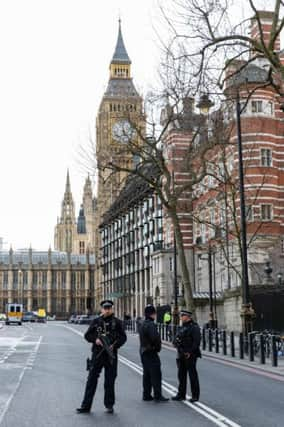Tom Peterkin: Attacks on London put Scottish politics into perspective


Sometimes it takes an appalling event to put things into perspective. Yesterday’s terrorist attack on the Palace of Westminster was such an event.
As paramedics tended the casualties, police officers displayed remarkable courage and Westminster went into lockdown, it took some time for news to filter to Holyrood.
Advertisement
Hide AdAdvertisement
Hide AdAs turmoil and tragedy gripped Westminster, MSPs initially continued debating the merits or otherwise of Scottish independence.
Holyrood politicians banged on about the oil price, Scotland’s place in the EU, an independent Scotland’s currency and the other arguments with which we have grown so familiar over the last few years.
As more details of the scale of the Westminster attacks drifted northwards, some people began to question whether it was appropriate for the session at Holyrood to continue.
Others were of the view that there were legitimate reasons for carrying on at Holyrood. Doing so, they argued, would have sent out the signal that MSPs would not kowtow to terrorism.
In the end, however, it did not feel right to keep going and Presiding Officer Ken Macintosh finally informed MSPs that Holyrood would be suspended.
Seventy-five minutes after the event occurred Mr Macintosh sensibly acknowledged that under the tragic circumstances most MSPs were uncomfortable continuing the independence debate.
Therefore the much-anticipated vote that last night would have given Nicola Sturgeon parliamentary backing to seek a second referendum was postponed. That political fight is for another day.
There was a feeling that it would have been wrong to press ahead for a vote to sever ties with Westminster at a time when expressing solidarity with a fellow parliament in its hour of need was the right thing to do.
Advertisement
Hide AdAdvertisement
Hide AdRather than continue with a discussion that looks set to dominate the Scottish political agenda for the foreseeable future, most preferred to concentrate their thoughts on the casualties, their families, colleagues and friends at Westminster.
The social media sites more commonly associated with channelling tribal abuse and political argument carried messages of concern and sympathy to those locked down at Westminster.
“My thoughts are with everyone in around Westminster caught up in this dreadful incident and with the brave emergency services,” tweeted Nicola Sturgeon.
“Very tense atmosphere here. Most of us just desperate to be with our families. So worried for those involved,” tweeted Ms Sturgeon’s Westminster-based colleague Carol Monaghan, SNP MP for Glasgow North West.
After MSPs had left the Holyrood chamber, the transport minister Humza Yousaf tweeted: “Holyrood suspended out of respect for our sister parliament and all that’s going on in Westminster. Thoughts with all down the road.”
The arguments over Scottish independence, which consumed the Holyrood village over the past few days, all of a sudden seemed a million miles away
But Mr Yousaf’s tweet did recall language used by that doughty SNP veteran Bruce Crawford on the first of what was supposed to be a two-day debate on Ms Sturgeon’s proposal for a second referendum.
In what had otherwise been a pretty unedifying and quarrelsome affair, Mr Crawford’s words stuck out.
Advertisement
Hide AdAdvertisement
Hide AdAnd when acts of barbarism inject a sense of proportion into political differences, they are worth recalling.
Mr Crawford, a former Cabinet minister and MSP for Stirling, called his “colleagues and friends” across all parties to “show respect” for each other’s point of view.
“If we characterise our opponents as divisive we will divide,” Mr Crawford said.
“If we use the language of hate we will create bitterness...The debate will be passionate and hard argued, and we may vehemently disagree with each other, but that does not need to lead to use of language that creates division and bitterness.”
If past experience is anything to go by, feelings will spill over. Given the passionate opinion aroused on both sides of the Scottish political debate it is almost inevitable. In 2014 there was a descent into nastiness despite pleas from both sides to cool the language and show respect.
The most poignant and articulate plea of that nature was made by Jim Sillars when he delivered a very moving eulogy to his late wife Margo MacDonald just a few months before the vote.
“I bring a message from Margo to all engaged in the campaign,” Mr Sillars said. “There will be harsh statements on both sides, the debate will be fierce, there will be verbal wounds inflicted, but if we conduct ourselves in the run-up to September 18 the Margo MacDonald way, the division will be much easier to heal.
“The Margo MacDonald way is to recognise that you are dealing with opponents, not enemies, not with ogres but with fellow human beings with whom you can disagree but must do so without malice,” said Mr Sillars.
Advertisement
Hide AdAdvertisement
Hide AdAttacks like those seen yesterday in London are a reminder of the need to protect our precious values of free speech and democracy against the evils of terrorism.
They are values that must be treated with respect. That is why following the Margo MacDonald way would be a good and respectful path to follow when normal Scottish parliamentary business reconvenes shortly.